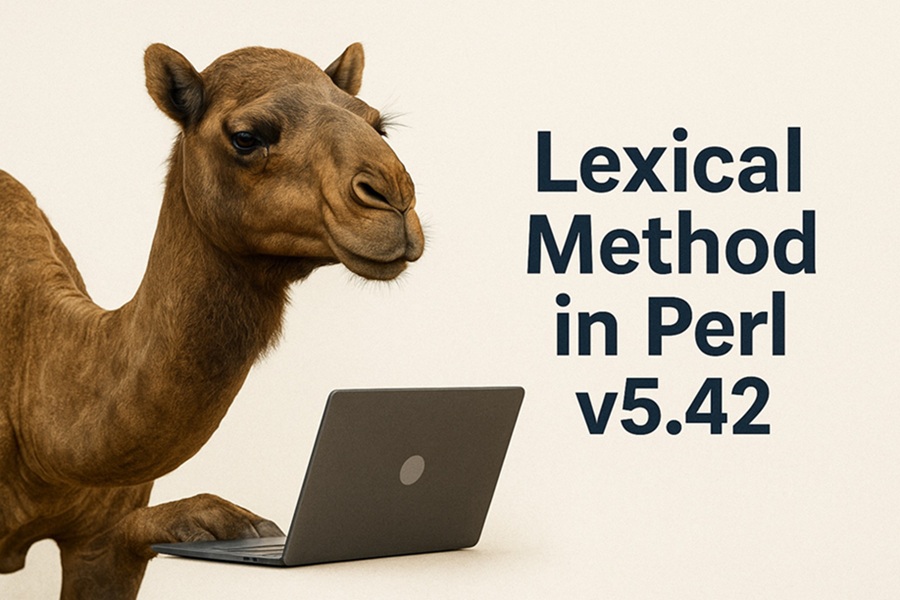DISCLAIMER: Image is generated using ChatGPT.
In February 2025, with the release of Perl v5.41.9, a method inside the new experimental class feature can be declared as a lexical method.
Before diving into the details, let’s take a step back.
How many of you know that Perl supports lexical subroutine?
To be precise, lexical subroutines were introduced in Perl v5.18.
If you haven’t seen them before, here’s how you declare one:
use v5.18;
{
my sub greet {
print "Hello World!!\n";
}
greet(); # Hello World!!
}
greet(); # Undefined subroutine
Following a similar pattern, Perl v5.41.9, allows us to define lexical methods.
When I say, lexical method, I am referring to a method defined inside the new experimental class feature.
To be honest, this was the biggest surprise for me, in this release.
A big round of applause to the entire Perl development team, their hard word makes each release exciting.
I couldn’t resist trying out the newly introduced lexical method as soon as it landed.
Here’s the example, I experimented with:
use v5.41;
use experimental 'class';
class Calc {
my method process($self, $x, $y, $op) {
if ($op eq '+') {
return $x + $y;
}
elsif ($op eq '-') {
return $x - $y;
}
elsif ($op eq '*') {
return $x * $y;
}
else {
return;
}
}
method plus($x, $y) {
$self->&process($x, $y, '+');
}
method minus($x, $y) {
$self->&process($x, $y, '-');
}
method multiply($x, $y) {
$self->&process($x, $y, '*');
}
}
my $calc = Calc->new;
say $calc->plus(3,2); # 5
say $calc->minus(3,2); # 1
say $calc->multiply(3,2); # 6
say $calc->process(3,2,'+'); # Can't locate object method "process" via package "Calc"
When I shared this with fellow Perl enthusiasts on social media, several people pointed out that $self shouldn’t be included when defining a lexical method.
Instead of this:
my method process($self, $x, $y, $op) {
if ($op eq '+') {
return $x + $y;
}
elsif ($op eq '-') {
return $x - $y;
}
elsif ($op eq '*') {
return $x * $y;
}
else {
return;
}
}
It should have been define like this:
my method process($x, $y, $op) {
if ($op eq '+') {
return $x + $y;
}
elsif ($op eq '-') {
return $x - $y;
}
elsif ($op eq '*') {
return $x * $y;
}
else {
return;
}
}
But, it never worked for me.
After some investigation, we discovered this was actually a bug and tracked as issue #23030.
Fast forward to today and I’m happy to report that with Perl v5.42 RC1, lexical methods are now in excellent shape.
Once again, all credit goes to the incredible Perl development team.
And now…we can finally do this.
use v5.42;
use experimental 'class';
class Calc {
my method process($x, $y, $op) {
if ($op eq '+') {
return $x + $y;
}
elsif ($op eq '-') {
return $x - $y;
}
elsif ($op eq '*') {
return $x * $y;
}
else {
return;
}
}
method plus($x, $y) {
$self->&process($x, $y, '+');
}
method minus($x, $y) {
$self->&process($x, $y, '-');
}
method multiply($x, $y) {
$self->&process($x, $y, '*');
}
}
my $calc = Calc->new;
say $calc->plus(3,2); # 5
say $calc->minus(3,2); # 1
say $calc->multiply(3,2); # 6
say $calc->process(3,2,'+'); # Can't locate object method "process" via package "Calc"
If you haven’t installed the latest release yet, you can get it in no time!
I personally use perlbrew to maintain all the latest Perl releases in isolated environment without affecting the system Perl.
In case, you need it, here’s how you can quickly get the latest release..
$ wget https://cpan.metacpan.org/authors/id/C/CO/CONTRA/perl-5.42.0-RC1.tar.gz
$ cp perl-5.42.0-RC1.tar.gz ~/perl5/perlbrew/dists/
$ perlbrew --notest install perl-5.42.0-RC1
$ ~/perl5/perlbrew/perls/perl-5.42.0-RC1/ -V:version
version='5.42.0';
$ alias p542='~/perl5/perlbrew/perls/perl-5.42.0-RC1/bin/perl'
$ p542 -V:version
version='5.42.0';
For those curious about what else is included in this latest release, all the details are documented in the perldelta page.
Happy Hacking !!!
